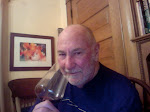Eric asked, a couple of weeks ago, about user-friendly books that might help him work his way through the maze of wine appellations, grapes and vineyards. I've been racking my brain ever since trying to come up with suggestions.
The two most obvious choices are Hugh Johnson's Pocket Encyclopedia of Wine (published yearly) and his World Atlas of Wine. These were books given to me very early by more experienced wine lovers. But I must admit they were never very helpful to me except as reference works. Others probably feel differently.
When I first got interested in wine, I read everything about wine I could get my hands on. I subscribed to The Wine Advocate, Connoisseur's Guide to California Wine, the California Grape Vine and the Quarterly Review of Wines. I read wine columns in Bon Appetit and Gourmet Magazine. What I wanted were recommendations for wines that would be exciting to drink. I suspect there were many others like me, and that was the environment in the early 1980s that created Robert Parker's popularity. His recommendations were sound, and they led me to wines like Cos d'Estournel, Hermitage la Chappelle, Chave Hermitage, Domaine Thalabert, Beaucastel and Vieux Telegraphe--all excellent values that escalated rapidly in price following Parker's reviews.
Looking back, what I see as most valuable in my wine education was the help of my wine merchant. Village Corner in Ann Arbor was an exceptional source because the store not only stocked a wide range of wines from all parts of the world but published a sales booklet every other month that provided detailed tasting notes and information about wine regions, appellations and producers. Village Corner's sales booklet was and is the most valuable handbook I have ever come across, and it was supported by personal recommendations and advice from staff such as Cheryl McMillan, Mike May, Rod Johnson, Ric Cerrini and Dick Scheer (the owner). Unfortunately, the VC sales booklet (with the familiar Village Corner mouse on the cover) is published less frequently today and no longer carries as much information about appellations. But it's still an incredibly valuable resource, and it's now supported by the web site and offerings (every two months) for members of the Ann Arbor Wine Club. AA Wine Club tastings are still organized according to appellation, and I go to one or two every year just to keep up on what's happening.
Wine merchants, of course, have a vested interest in selling the wines they have purchased from distributors. But a good wine merchant (or staff) who has tasted the wines being sold is probably a better source of information than any book or wine publication.
For informaton about wine regions, there are many good reference books. For the Rhone, Parker is the best known authority, but I also like the books by Robert Mayberry, John Livingstone-Learmonth (JLL also has a good web site: drinkrhone.com) and Remington Norman. For Bordeaux and Burgundy, I look to Clive Coates, Michael Broadbent as well as to Parker. Jacqueline Friedrich has an excellent book on wines of the Loire Valley; Burton Anderson has several good handbooks on Italian wine. I buy the Hachette Guide to French wine as often as I can find it in the book stores.
Books are good, but the best way to learn is to travel and taste. When you travel through the Rhone, you learn where Gigondas is in relation to Vacqueyras and Chateauneuf du Pape. You can taste at individual domaines and learn which ones suit your taste.
Wine has been a big part of my life, but I can't say that I regret the time I have devoted to this interest. The more I learn, the more new territories I find to explore. Wine feeds the mind as well as the senses. I love it.
Subscribe to:
Post Comments (Atom)





So that's where you've been hiding, Fred!
ReplyDeleteHave you read Jancis Robinson or any other of the recent new crop of wine enthusiasts?
~Eric
Hey, Eric. Yes, I've read Jancis' Vines, Grapes and Wines and Vintage Time Charts. Both are very important reference works for me, particularly since the wines she chose to track in the time charts are some of my old favorites: Jean Descombes Morgon, Cos d'Estournel, Potensac, Ridge Geyserville, Beaucastel, Wynn's Cab, etc. My time lines don't always match hers, but that's the way it goes. She has a web site as well, but if I subscribed to all the web sites I would find helpful, I wouldn't have any money to buy wine.
ReplyDeleteAmong more recent books, I really enjoyed The New France by Jeffords. I'm reading Neal Rosenthal's book right now and Robert Camuto's Uncorked is on the shelf.
I've had many good conversations on Robin Garr's Wine Lovers' Discussion Group, although I haven't been there in several years. And erobertparker.com can be useful.
Highly recommended for budding connoisseurs....
ReplyDeletehttp://www.delongwine.com/news/2009/03/31/playmobil-wine-bar/
That type of thing doesn't appeal to me, but I hardly consider it outrageous.
ReplyDeleteThe Wine & Spirits Wholesalers, I think, are more interested in their own profits than in the welfare of children, who manage somehow to get drunk on beer without any help from interstate or intrastate shipping.
These same wholesalers think it is "outrageous" for an adult to buy wine in Chicago and bring it back to Michigan or Indiana.
Okay, you got me. April Fool's passed, and I'm the biggest fool at last.
ReplyDeleteSo when did you think to go back and look at the date?
ReplyDeleteI know, I know....but if I followed the conventions, I wouldn't be drinking wine!
I hear you on out of state purchases. I don't know why this isn't considered to violate the interstate commerce clause of the Constitution.
~Eric